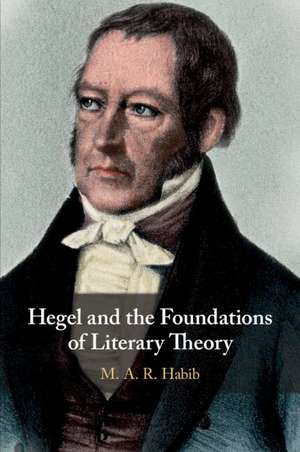Hegel and the Foundations of Literary Theory
Autor M. A. R. Habiben Limba Engleză Paperback – 7 dec 2022
| Toate formatele și edițiile | Preț | Express |
|---|---|---|
| Paperback (1) | 201.64 lei 6-8 săpt. | |
| Cambridge University Press – 7 dec 2022 | 201.64 lei 6-8 săpt. | |
| Hardback (1) | 698.50 lei 6-8 săpt. | |
| Cambridge University Press – 21 noi 2018 | 698.50 lei 6-8 săpt. |
Preț: 201.64 lei
Nou
Puncte Express: 302
Preț estimativ în valută:
38.58€ • 40.37$ • 32.05£
38.58€ • 40.37$ • 32.05£
Carte tipărită la comandă
Livrare economică 02-16 aprilie
Preluare comenzi: 021 569.72.76
Specificații
ISBN-13: 9781108457859
ISBN-10: 1108457851
Pagini: 349
Ilustrații: 1 b/w illus.
Dimensiuni: 152 x 229 x 19 mm
Greutate: 0.47 kg
Editura: Cambridge University Press
Colecția Cambridge University Press
Locul publicării:Cambridge, United Kingdom
ISBN-10: 1108457851
Pagini: 349
Ilustrații: 1 b/w illus.
Dimensiuni: 152 x 229 x 19 mm
Greutate: 0.47 kg
Editura: Cambridge University Press
Colecția Cambridge University Press
Locul publicării:Cambridge, United Kingdom
Cuprins
Introduction; Part I. Hegel: The Historical And Philosophical Setting: 1. The Hegelian dialectic; 2. Historical backgrounds; 3. Hegel, philosopher of capitalism; 4. Hegel on identity and difference; 5. Hegelian identity and economics; Part II. Literary Theory: Reading The Dialectic: 6. Hegel and deconstruction: 7. Hegel on language; 8. Literary theory on Hegel and language Saussure, Barthes, Derrida, Deleuze; 9. Hegel, language, and the unconscious Kristeva; 10. Hegel's dialectic of master and slave; 11. The master-slave dialectic in literary theory: allegorical readings: Gilles Deleuze, Jacques Derrida; 12. Marx on the Hegelian dialectic; 13. Hegel and Marxist literary theory (I) Horkheimer, Adorno and Benjamin; 14. Hegel and Marxist literary theory (II) Slavoj Žižek; 15. Hegel on woman: Antigone; 16. Feminists on Hegel and Antigone: Irigaray, Butler, (Derrida); 17. Historical contexts of Hegel's views on women; Epilogue: the futures of theory: towards a dialectical humanism.
Recenzii
'This is a wonderful and magisterial study which covers a vast range of philosophical material, both ancient and modern, and does so with enormous erudition, precision, force and clarity … brilliantly expounded via wonderfully complex readings and argumentation. What the study thus achieves is nothing less than a complete re-visioning of modern literary theory …' John Schad, Lancaster University
'M. A. R. Habib proposes in this immensely important and lucidly argued book Hegel's dialectical method as foundational for our moral and social conscience and as an indispensable critical tool for assessment of the deficiencies of modernity. The book presents Hegel's dialectics as a form of subversive thinking that anticipates contemporary literary theory by establishing identity as a process rather than as an essence, thus enabling a critique of the internal contradictions both of bourgeois thought and capitalist ideology. Hegel and the Foundations of Literary Theory is wonderfully readable. It elucidates both contemporary theory and Hegel's philosophy, and it is entirely convincing in its claim that liberal humanism is unthinkable without Hegel.' Harold Schweizer, Bucknell University, Pennsylvania
'M. A. R. Habib proposes in this immensely important and lucidly argued book Hegel's dialectical method as foundational for our moral and social conscience and as an indispensable critical tool for assessment of the deficiencies of modernity. The book presents Hegel's dialectics as a form of subversive thinking that anticipates contemporary literary theory by establishing identity as a process rather than as an essence, thus enabling a critique of the internal contradictions both of bourgeois thought and capitalist ideology. Hegel and the Foundations of Literary Theory is wonderfully readable. It elucidates both contemporary theory and Hegel's philosophy, and it is entirely convincing in its claim that liberal humanism is unthinkable without Hegel.' Harold Schweizer, Bucknell University, Pennsylvania
Notă biografică
Descriere
Habib argues that the basic principles and assumptions of modern literary theory derive from the thought of German philosopher Hegel.
